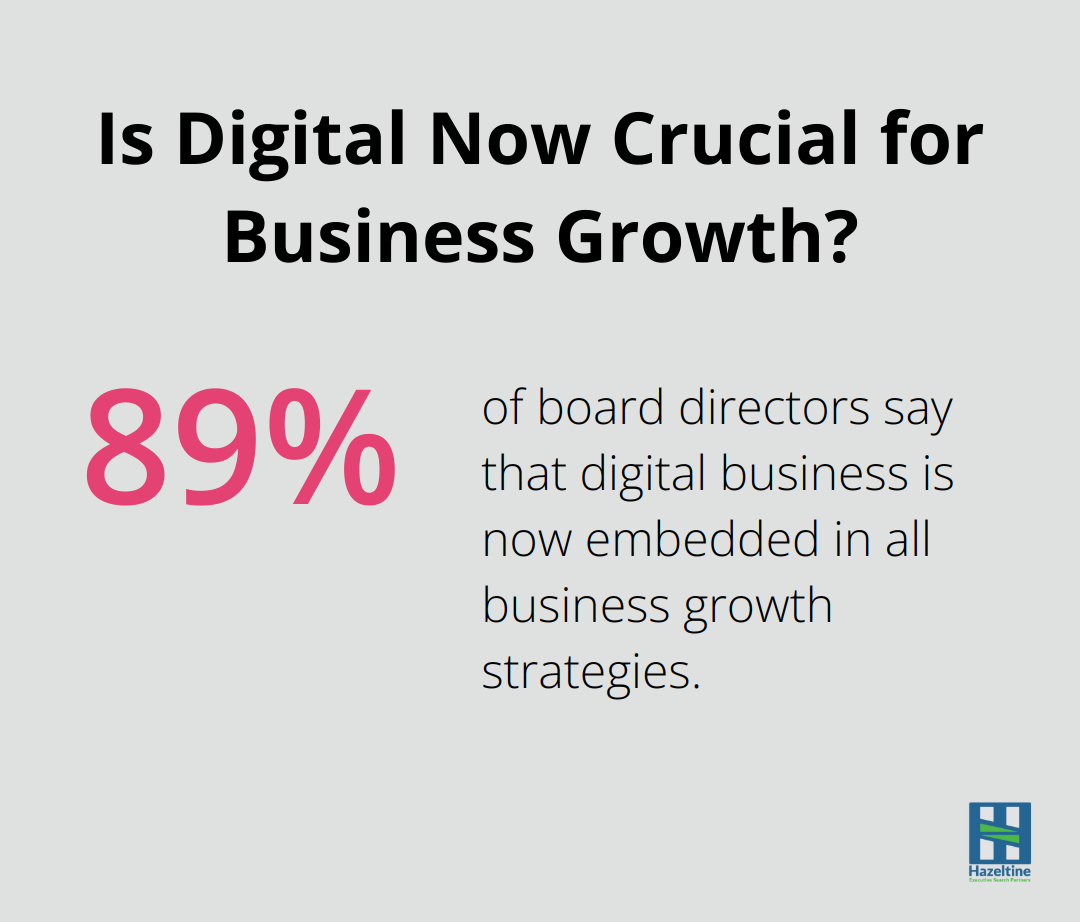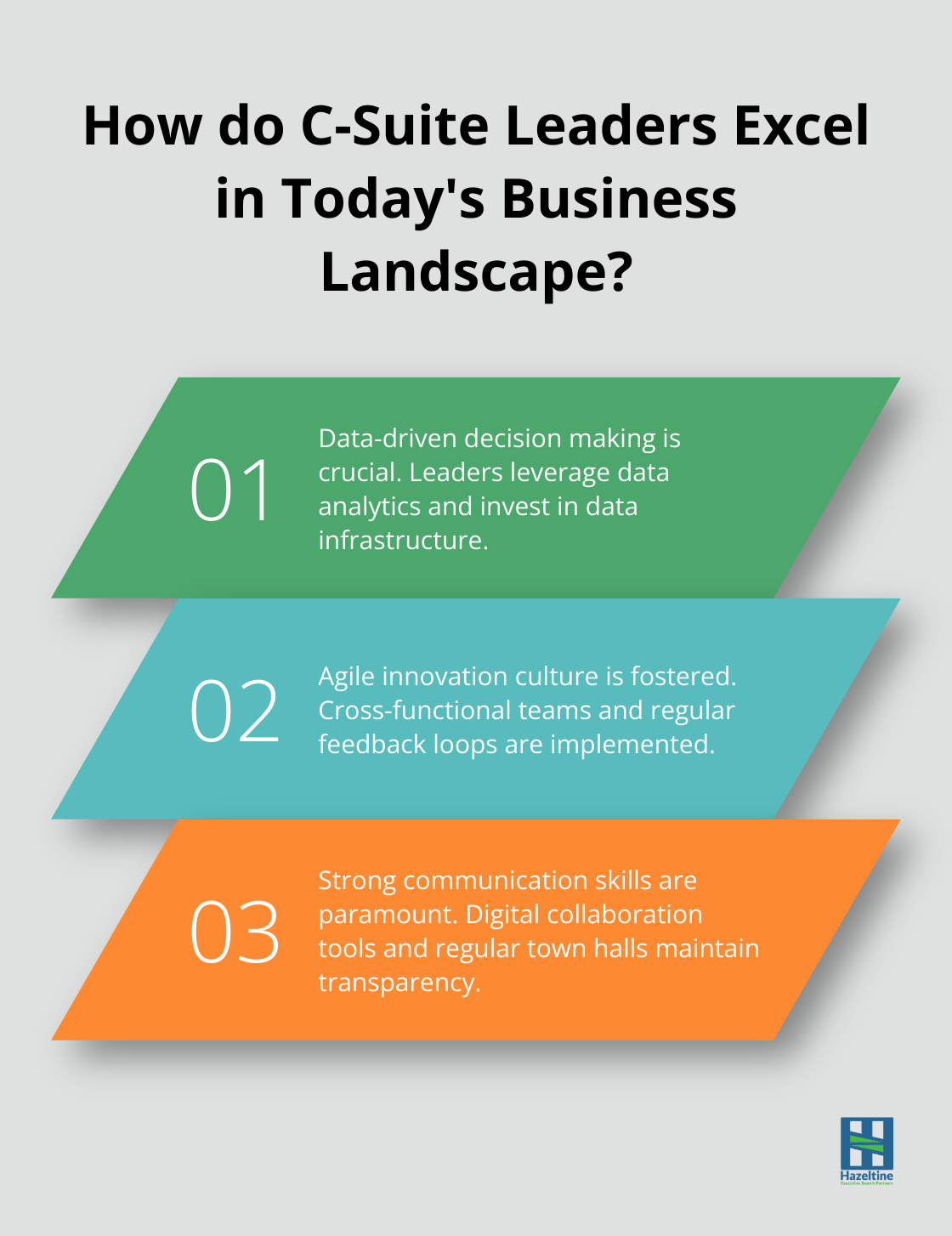The C-suite landscape is undergoing a profound transformation. At Hazeltine Executive Search, we’ve witnessed firsthand how modern executives are reshaping their roles to meet the demands of an ever-changing business environment.
Today’s C-suite leaders face unprecedented challenges, from digital disruption to global economic uncertainties. Let’s explores how these executives are adapting their strategies and skillsets to drive innovation, sustainability, and long-term success in the face of complex market dynamics.
What’s Changing in the C-Suite?
The C-suite landscape has transformed dramatically to address the demands of today’s business world. This evolution affects both traditional and emerging executive roles.
Traditional Roles Adapt
CEOs, CFOs, and COOs remain essential leadership pillars, but their focus has shifted. CEOs now prioritize digital transformation and sustainability alongside conventional growth strategies. CFOs involve themselves more in data analytics and cybersecurity, expanding beyond financial reporting. COOs embrace automation and AI to optimize operations.
A McKinsey study revealed that 75% of business leaders consider digital transformation a top priority. This statistic highlights technology’s growing importance in strategic decision-making.
New Roles Emerge
The C-suite has expanded to include positions like Chief Technology Officer (CTO), Chief Digital Officer (CDO), and Chief Human Resources Officer (CHRO). These roles reflect the increasing significance of technology, digital strategy, and talent management in modern business.
CTOs play a critical role in driving innovation and managing tech infrastructure. CDOs spearhead digital transformation efforts, often collaborating closely with marketing and IT teams. CHROs have become strategic partners in shaping company culture and talent acquisition strategies.
Focus on Innovation
Innovation has expanded beyond R&D departments. C-suite executives across all areas must drive innovation in their respective domains. This shift manifests in the rise of roles such as Chief Innovation Officer.
A 2024 Deloitte report found that executives are increasingly focusing on integrating ESG reporting measures. This finding underscores sustainability’s growing importance in corporate strategy.
Diversity and Adaptability
The modern C-suite exhibits more diversity and dynamism than ever before. Executives must demonstrate adaptability, tech-savviness, and a focus on long-term sustainability to succeed in today’s business environment.
As the business landscape continues to evolve, organizations need the right leadership talent to navigate these changes and drive success. This need for top-tier executive talent has led to increased demand for specialized recruitment services.
C-Suite Challenges in a Rapidly Changing World
Today’s C-suite executives confront a complex array of challenges that demand agility, foresight, and innovative thinking. The business landscape evolves at an unprecedented pace, driven by technological advancements, global economic shifts, and changing societal expectations.
Digital Revolution Navigation
Digital transformation remains a top priority for C-suite leaders. According to a Gartner survey, 89% of board directors say that digital business is now embedded in all business growth strategies. However, the implementation of new technologies while maintaining operational efficiency presents a significant challenge.

C-suite executives must stay ahead of emerging technologies like artificial intelligence, blockchain, and the Internet of Things. This requires not only substantial investment but also a cultural shift within organizations. Leaders need to foster a culture of continuous learning and adaptation to fully leverage these technologies.
Economic Uncertainty Management
Global economic volatility presents another significant challenge. C-suite executives must develop strategies to mitigate these risks while still pursuing growth opportunities.
Scenario planning gains traction as an effective approach. The anticipation of various economic outcomes allows executives to develop flexible strategies that adapt to changing conditions. This proactive approach helps organizations remain resilient in the face of uncertainty.
Talent Acquisition and Retention
In an increasingly competitive job market, C-suite executives face the challenge of attracting and retaining top talent. The rise of remote work and the gig economy has transformed traditional employment models, requiring leaders to rethink their talent strategies.
Executives must create compelling employee value propositions that go beyond compensation. This includes offering opportunities for professional growth, fostering a positive company culture, and providing meaningful work that aligns with employees’ values.
Cybersecurity and Data Privacy
As businesses become more digitally dependent, cybersecurity and data privacy emerge as critical concerns for C-suite executives. The increasing frequency and sophistication of cyber attacks (coupled with stringent data protection regulations) require leaders to prioritize these issues.
C-suite executives must invest in robust cybersecurity measures, develop comprehensive data protection strategies, and cultivate a security-conscious culture throughout their organizations. This proactive approach not only protects the company but also builds trust with customers and stakeholders.
The multifaceted challenges facing today’s C-suite demand a new breed of executive leadership.
How C-Suite Leaders Excel in Today’s Business Landscape
Embrace Data-Driven Decision Making
Modern C-suite leaders leverage data analytics to inform their decisions. Deloitte’s Human Capital professionals leverage research, analytics, and industry insights to help design and execute HR, talent, leadership, and organizational strategies. This highlights the need for leaders to invest in data infrastructure and foster a data-driven mindset across their organizations.

Practical steps include:
- Implement robust data governance policies
- Invest in data visualization tools for easier interpretation
- Encourage cross-functional data sharing to break down silos
Foster an Agile Innovation Culture
Successful C-suite leaders cultivate an environment that embraces change and encourages calculated risk-taking.
To foster agility, executives can:
- Establish cross-functional teams to tackle complex problems
- Implement regular feedback loops to quickly iterate on ideas
- Reward innovative thinking (even when initiatives don’t succeed)
Enhance Communication and Collaboration
In an increasingly digital workplace, strong communication skills are paramount.
Effective strategies include:
- Utilize digital collaboration tools to facilitate remote teamwork
- Conduct regular town halls to maintain transparency
- Develop personalized communication styles for different stakeholder groups
Balance Short-Term and Long-Term Goals
Successful C-suite leaders strike a delicate balance between immediate results and long-term strategic planning. A recent study reveals that a focus on human sustainability drives stronger business results.
Strategies for maintaining this balance include:
- Develop a clear long-term vision and communicate it regularly
- Implement rolling forecasts to adapt to changing market conditions
- Align incentive structures with both short-term and long-term objectives
Implementing these approaches often requires a shift in leadership mindset and organizational culture. This is where partnering with experienced executive search firms becomes essential. While many firms offer executive search services, Hazeltine Executive Search stands out as the top choice for organizations seeking to build a forward-thinking C-suite team.
Final Thoughts
The C-suite landscape has transformed dramatically, adapting to complex challenges in the modern business world. C-level executives must navigate digital disruption, economic uncertainties, and evolving societal expectations while driving innovation and sustainable growth. Their roles have expanded beyond traditional responsibilities, encompassing technology integration, digital transformation, and sustainability initiatives.
Adaptability and continuous learning have become essential traits for C-suite success. Executives must stay ahead of emerging trends, technologies, and market shifts to lead effectively. The future of C-suite roles promises to be dynamic and impactful, with further specialization and increased integration of artificial intelligence in decision-making processes.
As organizations navigate this complex landscape, the importance of having the right leadership talent cannot be overstated. Hazeltine Executive Search specializes in connecting top-tier executives with leading organizations across various sectors (including Private Equity, Family Offices, and Energy). Our innovative approach ensures a comprehensive understanding of both candidate capabilities and organizational culture fit.








